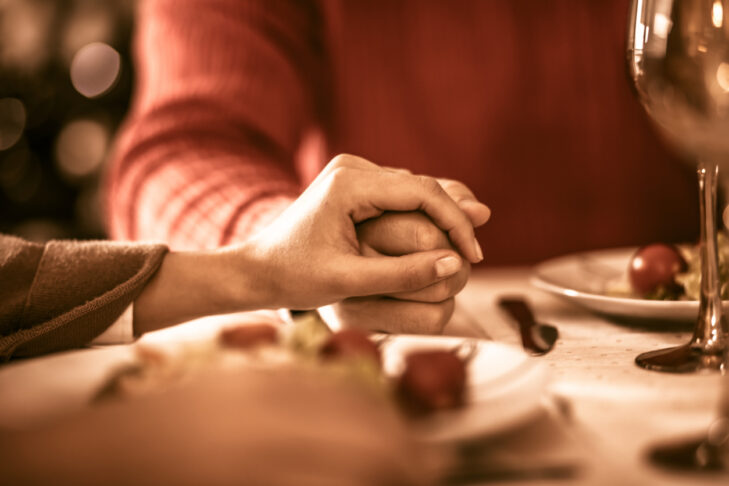The other day I asked readers what they’re grateful for this season, during a time when there’s so much upheaval, chaos and fear. Happily, you had plenty to say. Yes, it’s possible to feel the dual emotions of gratitude and sadness, of loss and appreciation.
Now I’m turning to a professional: Rabbi Elizabeth Bonney-Cohen, assistant rabbi and director of outreach and innovation at Congregation Kehillath Israel in Brookline (and a mom!). Here are her thoughts on framing gratitude through a Jewish lens and how to find pleasure in small moments.
How do people who might be really missing their family this holiday, who feel disenfranchised, lonely or faithless, get by right now?
It’s such an important question, and I think you’ve hit it right on in terms of what people are holding right now. Not only is Thanksgiving a time to be grateful and joyful and surrounded by friends and family, but it does really often mean being physically surrounded by those friends and family—being able to pass your baby to your in-laws or to your parents or to your cousins, and to be able to not only get that break for yourself but to see the spark in their eyes as they snuggle in close.
We’re missing that this year. Jews, we’ve already been through all of our major holidays apart from our families, so we are in some ways very prepared for this. It’s painful. It’s really, really painful, and it’s something that, unfortunately, we’ve experienced starting from Passover.
What does Judaism teach us about gratitude?
I think Judaism’s orientation to gratitude is a profound one. It necessitates going beyond ourselves and tapping into something that’s outside of ourselves. And so much during this pandemic time, we’ve been so enmeshed in what’s going on in our own lives. We are in our homes day in and day out, surrounded by the same people day in and day out, and often for parents especially, with no break, and it can feel totally immersive. We’re only focused on, “OK, what are the kids going to eat for the next meal or the next snack?” Or, “How long do I have while the kids are napping to finish this thing that I need to do for work?” It can feel very self-oriented, which I think is very natural. In normal times, we would be able to meet up with friends at a restaurant and hear about what’s going on in their lives, and it’s an opportunity to get out of our own self and get into somebody else’s experience.
Related
How do you frame talking to kids about Thanksgiving? Some of us are already well-versed in not seeing family, but this is a holiday based on giving thanks—and kids might not feel like there’s anything to be thankful for either.
I think in many ways kids are so much more resilient than adults are, and maybe they can actually help the adults in the room notice the opportunities for gratitude. I find so often that when my husband and I are feeling irritated or overwhelmed or anxious, my son, who is 3-and-a-half, will notice something small—whether it’s a bug in nature or the way the light is reflecting on the china—and point that out and help to acknowledge the beauty in this world. Again, it helps us to get out of ourselves, those big things that are troubling us, to take stock of what is also surrounding us every moment, which are opportunities for gratitude and opportunities for wonder and awe and appreciation. And so I think we need to allow for their lens to be invited into our world as adults, to see the world through their lives and through their lenses.
The Jewish words that we start our day with are words of gratitude. The very first words on our lips are supposed to be those of gratitude, of acknowledging that here we are, we have woken up alive again today, and we have another day on this earth and how could we spend it? How can we use it? And yes, there is so much pain right now that so many of us are carrying, and thank God we have this day to wake up to. We can reflect on parts of their day that they feel grateful for. Who do they encounter that they’re grateful for? We can try to bring those pieces out and then, of course, we try to connect also with family who are far away, whether that’s by doing an activity with them over FaceTime or just simply talking with them.
Can you contextualize this historical moment, from the pandemic to political upheaval, in a broader Jewish perspective? How do you frame a situation that might feel indefinite?
In many ways, I think of our moment as kind of a liminal time, like a space between. My grandmother always would tell me, “We should never wish away time.” My grandmother’s Catholic, but she would say we should never wish away time. And I think, when we say, “Oh, is there a light at the end of the tunnel?” in some ways we’re wishing away time. We’re wishing away this moment. And so instead I think about it as this liminal time, a time between. And Judaism marks that time both in a very metaphoric way but also in a very tangible way. I think of a mezuzah, for example, which goes at a doorpost. Well, a doorpost is something we usually just take for granted; it’s a door frame that connects two rooms. But in a bigger way, it’s the space between. And we place a piece of Torah on our doorpost, on this space between, as a recognition that in those liminal times, we need something else that’s just a little bit more grounding that anchors us a little bit more, because that space between is nerve-racking, anxiety-provoking and unsettling.
I would say during this time I think of that mezuzah as a nice symbol of the liminal and that our tradition acknowledges that the liminal exists. It’s unsettling and it’s even painful, and it’s not something to be wished away. And I think gratitude has a big role in that. If we have a gratitude practice that anchors our every day, in this COVID-19 time, every day won’t just seem like a blur into itself. And if we can offer one moment of gratitude for the day, we allow it to be its own unit, if that makes sense. And we mark that time rather than writing it off or crossing off yet another box on the calendar.
Any other parting thoughts for parents during this craziness?
Especially for parents, have compassion for yourself. This is really, really hard. Try not to recreate things as they should have been but rather see it as an opportunity to think of something different. Maybe Thanksgiving isn’t going be a big, full table of family and friends. Maybe it’s just going to be your little unit, but maybe there are ways you can infuse a conversation of gratitude, or invite that childlike lens on the day, and that can be enough. It doesn’t have to be the big turkey and all the feasting in order for it to be a meaningful time.




